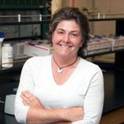
The deep sea is a unique and extreme environment characterized by low concentrations of highly recalcitrant carbon. As a consequence, large organic inputs have potential to cause significant perturbation. To assess the impact of organic enrichment on deep sea microbial communities, we investigated bacterial diversity in sediments underlying two whale falls at 1820 and 2893 m depth in Monterey Canyon, as compared with surrounding reference sediment 10-20 m away. Bacteroidetes, Epsilonproteobacteria and Firmicutes were recovered primarily from whale fall-associated sediments, while Gammaproteobacteria and Planctomycetes were found primarily within reference sediments. Abundant Deltaproteobacteria were recovered from both sediment types, but the Desulfobacteraceae and Desulfobulbaceae families were observed primarily beneath the whale falls. UniFrac analysis revealed that bacterial communities from the two whale falls (approximately 30 km apart) clustered to the exclusion of corresponding reference sediment communities, suggesting that deposition of whale fall biomass is more influential on deep sea microbial communities than specific seafloor location. The bacterial population at whale-1820 at 7 months post deposition was less diverse than reference sediments, with Delta- and Epsilonproteobacteria and Bacteroidetes making up 89% of the community. At 70 months, bacterial diversity in reference sediments near whale-2893 had decreased as well. Over this time, there was a convergence of each community's membership at the phyla level, although lower-taxonomic-level composition remained distinct. Long-term impact of organic carbon loading from the whale falls was also evident by elevated total organic carbon and enhanced proteolytic activity for at least 17-70 months. The response of the sedimentary microbial community to large pulses of organic carbon is complex, likely affected by increased animal bioturbation, and may be sustained over time periods that span years to perhaps even decades.
Available at: http://works.bepress.com/shana_goffredi/10/
